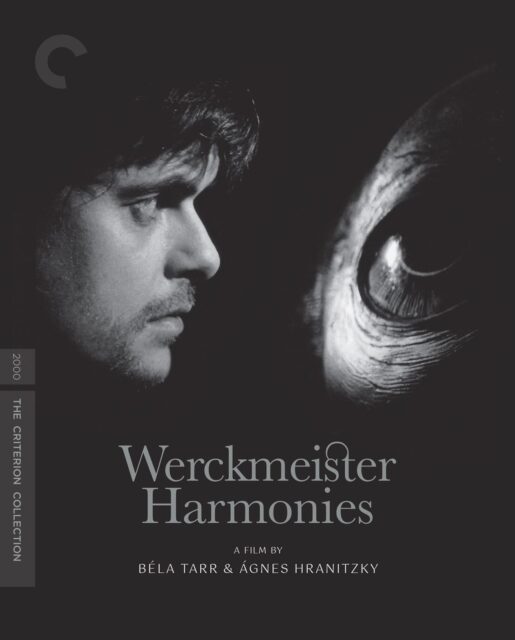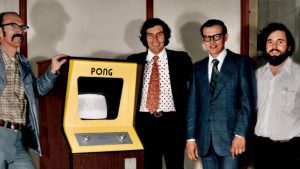
The post Home Video Hovel: Werckmeister Harmonies, by Scott Nye appeared first on Battleship Pretension.
I’ve seen Werckmeister Harmonies three times – first in 2012 on 35mm at a Los Angeles retrospective dedicated to its director, Béla Tarr; then in 2018 at a one-off screening, also 35mm, in New York; and finally this past week, via the new 4K UHD edition Criterion has just released. Each screening was six years apart, and each came about through some element of chance – in 2012, I was working nights, and happened to have that evening free; in 2018 I happened to be in New York for work and it was playing immediately after I clocked out; and this week I happened to be sent a disc for review, lending an urgency to watching it quickly rather than putting it off the way we sometimes can with purchases.
I say this because from its opening scene (which is, in a fashion familiar to Tarr’s work, entirely contained in its opening shot), Werckmeister Harmonies is more-than-glancingly concerned with the natural rotation of the world and the way movements within it rise and fall. János (Lars Rudolph), a young man, not overly bright but relentlessly inquisitive, demonstrates the celestial movement of the sun, the Earth, and its moon, and how that leads to an eclipse (in other glancing coincidences, an eclipse was visible to North America ten days ago). His demonstration is as troubling as it is enlightening; as limited as János’s education may be, the other people in his small town lack his curiosity and sense of awe. Natural phenomenon is a source of wonder for some, doom for others.
Much of what follows is conveyed in suggestion and symbols. Unrest is brewing in town. Everyone’s warning each other to be careful in the streets. Things could explode at any moment. And then the circus comes to town; after a fashion, anyway. A large truck carries a gigantic whale, and an unmotivated barker of sorts stands outside to sell tickets to see it. A man called The Prince travels with him. And all of this makes everyone just a little more uneasy for reasons that will not be explicated, thank you very much.
Yet for basically the past sixty years, and indeed probably as long as people have lived in community with one another, the context for the essential feeling of Werckmeister Harmonies is ever-changing and omnipresent. One needn’t have the context the film denies us; the context is all around us. At the time Lászlo Krasznahorkai wrote his 1989 novel The Melancholy of Resistance, on which the film is based, the Eastern Bloc into which Hungary had been swept was deeply unstable, and the Soviet Union soon to fall. In 1997, which production on the film initiated, the end of the millennium was looming, an eventuality some approach hopefully, others mournfully.
Today? One can only do a grand, sweeping hand gesture at basically everything. The sense of imminent collapse is so embedded in contemporary society that insurance companies are cutting catastrophes from their coverage options. Every election is posited as a referendum on our basic survival. And if the world at large isn’t trying to kill us, fascist rioters or lone gunmen will do just fine. What started as direct political allegory and morphed into abstract representation has now wrapped back around to being near-documentary.
For those who may be intimidated by Tarr’s work – what, a series of black-and-white depictions of social and moral collapse that range in running time between two and seven-and-a-half hours isn’t compelling enough? – I must say that if you can let go of the expectation for some degree of expository content, my overwhelming experience with his work is that it’s so much more accessible than it seems. While he doesn’t provide what we might call “narrative beats,” his approach to storytelling is quite classical – the viewer is never unsure of where to look in his frames, and the action we’re meant to take from those long shots never obscured. They unfold like a train of thought more than any kind of abstract depiction, and the overwhelming tone of his work is far from obscured.
Moreover, Werckmeister Harmonies is really the ideal starting place, so even if Criterion’s current options for his available films was limited (more on that at the end of this piece), it’s another bit of cosmic fortune that America’s most prestigious home video distributor is starting here.
And they started with a bang. The new transfer, from a 4K master scanned and restored by the National Film Institute Hungary and Cinegrell and approved by Tarr, is marvelous. It retains the depth and bold saturation of the 35mm experience, with all significant traces of damage removed and cleaned up. Nearly all of Tarr’s films, including this one, are in black-and-white, but utilize a wide range of color tones, with the whites especially needing to really burn through the screen. The biggest difference between celluloid projection and digital files is that whites are the pure light of the projector pouring through to the screen. They should be intense! There’s a particular moment I was looking for at the end of the riot sequence that provides the clearest illustration of this, and thankfully this new transfer is up to the challenge, but hints of it are available right away from the lamp János carries around the tavern.
What’s more, while the full 4K edition offers a clear advantage, the regular high-def version on Blu-ray doesn’t feel at all like a downgrade the way some others have. Compression artifacts are occasional but quite minimal. If you have a 4K set-up or suspect you will someday, the premium edition is a no-brainer and well worth the extra money, but if you’re stuck on Blu, you’re hardly getting some subpar edition. Audio, too, via an uncompressed monaural soundtrack, is very clear and resonant. A DVD edition is also available, but we did not review it.
Supplements take the “few but dense” approach of recent Criterion editions. Start, if you’re interested, with Tarr’s 1979 debut feature Family Nest. The transfer leaves a bit to be desired – packing the 108-minute film on the same Blu-ray disc as the 145-minute main film left me curious how they’d manage the compression on each, and it seems Family Nest got the short end of the stick. Shot on handheld 16mm and far less visually ornate, it was the right film to let take the hit, and it was recently restored so it’s far from ugly, but the film looked considerably better on DCP when I saw it last June. I’m a bit mixed on it overall – it’s passionate and impactful, but it’s always dangerous to start your career as a twenty-something with a film this loose and improvised, and the lack of experience shows.
A 21-minute interview with Tarr, conducted by film critic Scott Foundas, follows, and provides a great overview of Tarr’s career, with natural emphasis on Werckmeister. Tarr is a true artist, passionate and well-spoken with rigorous aesthetic principles for his medium, but also a true collaborator – he worked with the same writer, editor, and composer for most of his career, and he is quick to share credit with them. Finally, a lovely essay by New York Film Festival Artistic Director Dennis Lim is available in a foldout one-sheet included in the release, with the essay on one side and a poster on the other.
In three brief years, Béla Tarr’s most significant and impactful films – Damnation, Sátántangó (both from Arbelos Films), and now Werckmeister Harmonies – have gone from near-obscurity to wide availability (his final, equally significant, film The Turin Horse has been in circulation via Cinema Guild since its 2011 premiere). Tarr’s focus on the theatrical experience is beyond understandable to those fortunate enough to see these works on 35mm with an audience. The spell they conduct, at turns trying and electrifying, as well as the aesthetic texture the format provides, are beyond reproach, and the facile DVD editions distributed in the mid-2000s were wholly inadequate to convey that experience. HD and now UHD provides a whole different toolset, and thankfully boutique distributors have taken the reins to see it through. As someone who heard about his work ten years before getting to see it, this is a very joyful development.
The post Home Video Hovel: Werckmeister Harmonies, by Scott Nye first appeared on Battleship Pretension.
The post Home Video Hovel: Werckmeister Harmonies, by Scott Nye appeared first on Battleship Pretension.








